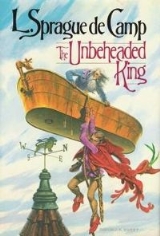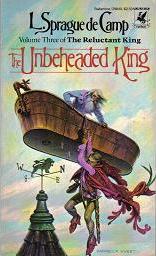
The Unbeheaded King
Encyclopedia
The Unbeheaded King is a fantasy
novel by American writer L. Sprague de Camp
, the fourth book of his Novarian series
and the third in the "Reluctant King
" trilogy featuring King Jorian of Xylar. It was first published as a hardcover by Ballantine Books
in 1983 and later reprinted in paperback by the same publisher. An E-book
edition was published by Gollancz
's SF Gateway imprint on September 29, 2011 as part of a general release of de Camp's works in electronic form.
, ex-king Jorian of Xylar and Dr. Karadur flee the revolt-stricken city of Iraz in the bathtub of its lately deceased monarch Ishbahar, borne through the air by Gorax, an invisible demon in the service of Karadur.
In accordance with the doctor's previous promise, the demon flies them to Xylar to rescue Jorian's favorite wife Estrildis, imprisoned there by the kingdom's authorities in the hope of enticing Jorian, whom they intend to execute, back into their power.
The plan miscarries, and the demon is barely able to spirit the hapless rescuers off to the neighboring city-state of Othomae, where it deposits them, tub and all, in the park of the Grand Duke. There they are promptly arrested for trespassing.
Effecting their release takes some time, largely because their sadistic jailer Maltho, who bears a grudge against Jorian from a previous acquaintance, balks their efforts to send word of their plight to friends outside.
Finally free, they attempt to accumulate resources for another attempt to recover Estrildis; difficult, since Jorian must remain in hiding from the Xylarians.
Ultimately, eschewing heroics, he hires Abacarus, a sorcerous colleague of Karadur to do the job, again by means of a demonic servant. To his dismay, the demon Ruakh returns with the wrong woman, Estrildis' attendant Margalit.
He is further from his goal than ever, and now mired in a lawsuit over fulfillment of the contract to boot! Disenchanted with magical shortcuts, Jorian contacts his family in Kortoli and commissions his younger brother Kerin to reconnoiter Xylar.
Kerin returns with word that Thevatas, one of Estrildis' guards is susceptible to bribery, and Jorian and Karadur accordingly return to Xylar in the guise of Mulvanians (traveling entertainers similar to Gypsies), where the subverted guard delivers Estrildis in return for the crown of Xylar, which Jorian had hidden after his initial escape from execution. But now Jorian discovers Estrildis had taken a lover in his absence and doesn't want to be rescued!
Soft-hearted, Jorian surrenders her to her lover Corineus and takes up with Margalit instead, of whom he has grown fond in the interim. (As was manifestly clear long before this moment, the resourceful, practical and level-headed Margalit is a far more suitable mate for Jorian than the emotional Estrildis.)
A Xylarian judge Jorian has taken hostage weds him to his new love, who is then able to free the cursed spirit of Lorc, a baronial ghost who has aided them. Beset by both bandits and pursuing Xylarians, the party makes its escape to Othomae again.
In a postscript, Jorian has returned to Kortoli with his new wife and joined the family clockmaking firm; there he learns that a revolution in Xylar has overthrown the regicidal regime, and he is at last out of danger from his former subjects. In fact, he is now their national hero, and they want him back on an (unthreatened) throne - an offer he politely declines.
This last scene is in fact the only one in the Jorian sequence showing the hero in his homeland of Kortoli - though the readers have gained a though acquaintance with it though the folk tales told by him and embedded in various books.

theme.
Fantasy
Fantasy is a genre of fiction that commonly uses magic and other supernatural phenomena as a primary element of plot, theme, or setting. Many works within the genre take place in imaginary worlds where magic is common...
novel by American writer L. Sprague de Camp
L. Sprague de Camp
Lyon Sprague de Camp was an American author of science fiction and fantasy books, non-fiction and biography. In a writing career spanning 60 years, he wrote over 100 books, including novels and notable works of non-fiction, including biographies of other important fantasy authors...
, the fourth book of his Novarian series
Novarian series
The Novarian series is a sequence of fantasy stories by L. Sprague de Camp, published between 1968 and 1989. The series contains some of de Camp's most innovative works of fantasy, featuring explorations of various political systems, an inversion of the "rags to royalty" pattern characteristic of...
and the third in the "Reluctant King
The Reluctant King
The Reluctant King is the overall title of a trilogy of fantasy novels written by L. Sprague de Camp as part of his Novarian series, as well as the 1983 omnibus collection gathering the books together into one volume...
" trilogy featuring King Jorian of Xylar. It was first published as a hardcover by Ballantine Books
Ballantine Books
Ballantine Books is a major book publisher located in the United States, founded in 1952 by Ian Ballantine with his wife, Betty Ballantine. It was acquired by Random House in 1973, which in turn was acquired by Bertelsmann AG in 1998 and remains part of that company today. Ballantine's logo is a...
in 1983 and later reprinted in paperback by the same publisher. An E-book
E-book
An electronic book is a book-length publication in digital form, consisting of text, images, or both, and produced on, published through, and readable on computers or other electronic devices. Sometimes the equivalent of a conventional printed book, e-books can also be born digital...
edition was published by Gollancz
Victor Gollancz Ltd
Victor Gollancz Ltd was a major British book publishing house of the twentieth century. It was founded in 1927 by Victor Gollancz and specialised in the publication of high quality literature, nonfiction and popular fiction, including science fiction. Upon Gollancz's death in 1967, ownership...
's SF Gateway imprint on September 29, 2011 as part of a general release of de Camp's works in electronic form.
Plot summary
In this sequel to The Clocks of IrazThe Clocks of Iraz
The Clocks of Iraz is a fantasy novel by American writer L. Sprague de Camp, the second book of both his Novarian series and the "Reluctant King" trilogy featuring King Jorian of Xylar. It was first published as a paperback by Pyramid Books in 1971 and later reprinted by Del Rey Books...
, ex-king Jorian of Xylar and Dr. Karadur flee the revolt-stricken city of Iraz in the bathtub of its lately deceased monarch Ishbahar, borne through the air by Gorax, an invisible demon in the service of Karadur.
In accordance with the doctor's previous promise, the demon flies them to Xylar to rescue Jorian's favorite wife Estrildis, imprisoned there by the kingdom's authorities in the hope of enticing Jorian, whom they intend to execute, back into their power.
The plan miscarries, and the demon is barely able to spirit the hapless rescuers off to the neighboring city-state of Othomae, where it deposits them, tub and all, in the park of the Grand Duke. There they are promptly arrested for trespassing.
Effecting their release takes some time, largely because their sadistic jailer Maltho, who bears a grudge against Jorian from a previous acquaintance, balks their efforts to send word of their plight to friends outside.
Finally free, they attempt to accumulate resources for another attempt to recover Estrildis; difficult, since Jorian must remain in hiding from the Xylarians.
Ultimately, eschewing heroics, he hires Abacarus, a sorcerous colleague of Karadur to do the job, again by means of a demonic servant. To his dismay, the demon Ruakh returns with the wrong woman, Estrildis' attendant Margalit.
He is further from his goal than ever, and now mired in a lawsuit over fulfillment of the contract to boot! Disenchanted with magical shortcuts, Jorian contacts his family in Kortoli and commissions his younger brother Kerin to reconnoiter Xylar.
Kerin returns with word that Thevatas, one of Estrildis' guards is susceptible to bribery, and Jorian and Karadur accordingly return to Xylar in the guise of Mulvanians (traveling entertainers similar to Gypsies), where the subverted guard delivers Estrildis in return for the crown of Xylar, which Jorian had hidden after his initial escape from execution. But now Jorian discovers Estrildis had taken a lover in his absence and doesn't want to be rescued!
Soft-hearted, Jorian surrenders her to her lover Corineus and takes up with Margalit instead, of whom he has grown fond in the interim. (As was manifestly clear long before this moment, the resourceful, practical and level-headed Margalit is a far more suitable mate for Jorian than the emotional Estrildis.)
A Xylarian judge Jorian has taken hostage weds him to his new love, who is then able to free the cursed spirit of Lorc, a baronial ghost who has aided them. Beset by both bandits and pursuing Xylarians, the party makes its escape to Othomae again.
In a postscript, Jorian has returned to Kortoli with his new wife and joined the family clockmaking firm; there he learns that a revolution in Xylar has overthrown the regicidal regime, and he is at last out of danger from his former subjects. In fact, he is now their national hero, and they want him back on an (unthreatened) throne - an offer he politely declines.
This last scene is in fact the only one in the Jorian sequence showing the hero in his homeland of Kortoli - though the readers have gained a though acquaintance with it though the folk tales told by him and embedded in various books.

Setting
Unlike The Goblin Tower and The Clocks of Iraz, which take Jorian far afield to other countries, most of the action in The Unbeheaded King takes place in Novaria, mainly the city-states of Xylar and Othomae. As usual, the political constraints under which the protagonist labor are at least as important as the fantastic element. The decidedly unromantic, even hardscrabble circumstances under which he must achieve his goals leaven the fantasy with a strong sense of reality, and highlight de Camp's unusual reversal of the genre's stereotypical rags to richesRags to riches
Rags to Riches refers to any situation in which a person rises from poverty to wealth, or sometimes from obscurity to fame. This is a common archetype in literature and popular culture ....
theme.

